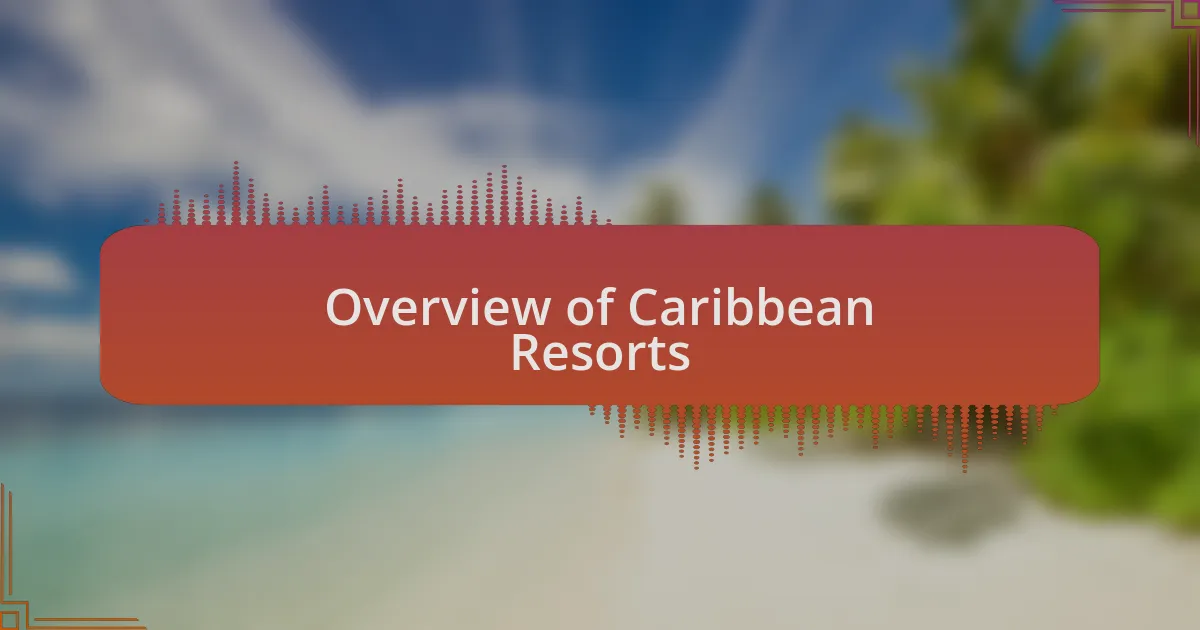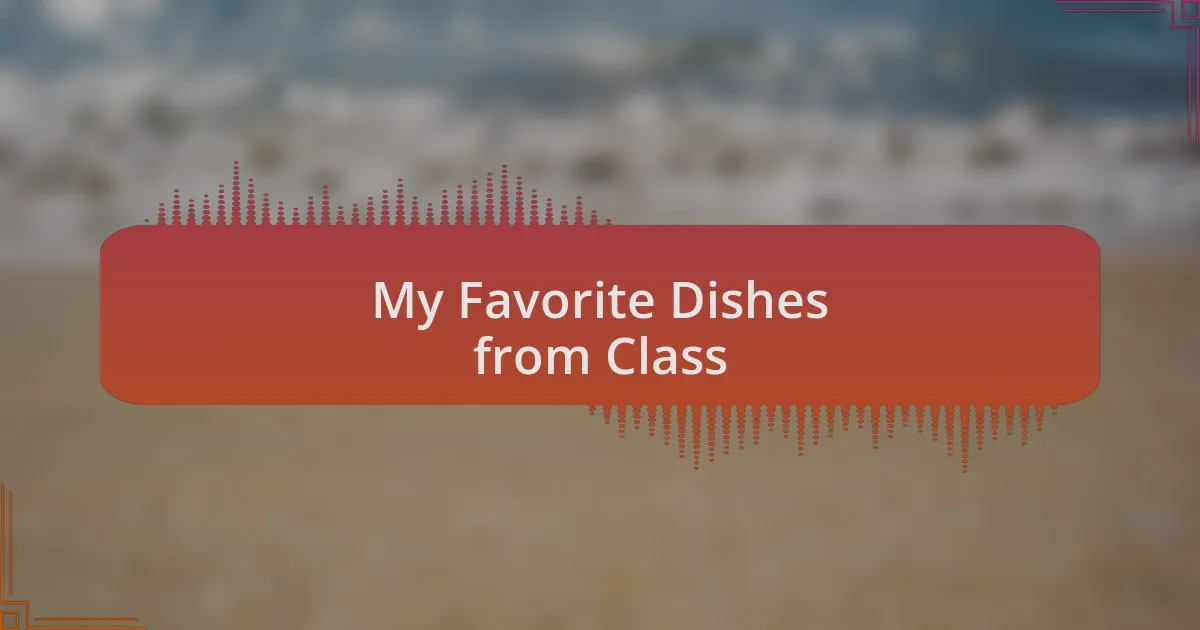Key takeaways:
- Caribbean resorts offer a combination of relaxation and adventure, enriched by local cultural experiences and warm hospitality.
- Cooking classes provide hands-on engagement with local cuisine, fostering connections with participants and enhancing cultural understanding.
- Lucian cuisine, influenced by diverse cultures, emphasizes fresh, local ingredients and the communal aspect of dining.
- Preparing for a cooking class with an open mind and actively participating in discussions enhances the overall experience and fosters creativity.

Overview of Caribbean Resorts
Caribbean resorts offer a unique blend of relaxation and adventure, making them a prime destination for travelers seeking both escape and exploration. During my stay at a small resort in Saint Lucia, I experienced this balance firsthand; the tranquil beaches were just steps away from vibrant nightlife and local cultural experiences. Can you imagine waking up to the sound of gentle waves while knowing an exciting day awaits you?
Each island has its own distinct flavor, which adds to the overall allure of Caribbean resorts. I once found myself at a charming boutique hotel where the owner shared stories of local traditions over a delicious breakfast. It struck me how these personal interactions enhance the experience, transforming a simple vacation into something far more enriching.
The hospitality found in Caribbean resorts is second to none, creating a warm and inviting atmosphere that welcomes every guest. I still remember the genuine smiles of the staff and how they made me feel like part of a larger family. Isn’t it refreshing to be in a place where the people truly care about your comfort and joy?

Benefits of Cooking Classes
Taking a cooking class can transform your understanding of local cuisine. I remember feeling a rush of excitement as I chopped fresh herbs and learned techniques that locals had perfected over generations. Engaging with the culture through food is a delightful way to connect deeper with the destination. Don’t you think it’s fascinating how each dish tells a story of the land and its people?
Another significant advantage is the hands-on experience it offers. I found myself immersed in the vibrant colors and scents of the kitchen, a sensory experience that no restaurant can replicate. There’s something magical about preparing your own meals, especially when you get to savor the fruits of your labor. Have you ever felt that sense of accomplishment when you create something delicious? It’s incredibly rewarding!
Additionally, cooking classes are a fantastic opportunity to meet like-minded individuals. I made some treasured friends during a class where laughter and conversation flowed just as freely as the rum punch. This shared experience not only enriched my travel journey but also helped me create lasting memories beyond the plates of food. Isn’t it wonderful how food has the power to bring people together?

Understanding Lucian Cuisine
Lucian cuisine is a vibrant tapestry of flavors that reflects the island’s rich cultural heritage. During my cooking class, I discovered that many dishes are inspired by African, French, and East Indian influences. One dish that left a lasting impression on me was callaloo, a creamy spinach-like soup that embodies the essence of the islands. Can you imagine how a dish can represent an entire culture’s history on a plate?
As I learned to create traditional dishes like fish escovitch, I realized the importance of fresh, local ingredients in Lucian cooking. The chefs often emphasized how using seasonal produce elevates the flavors, and I couldn’t agree more. It struck me that every bite was not just a taste; it was a slice of the island. Have you ever thought about how the land itself could lend its character to the food you enjoy?
What really captivated me about Lucian cuisine was the communal aspect of dining. Learning to prepare dishes meant sharing stories and laughter around the stove. I remember feeling the warmth of camaraderie as everyone contributed to the meal together. It made me reflect on how food can create connections, both personal and cultural. Doesn’t it seem profound that sharing a meal can bring people—and their stories—together?

Preparing for a Cooking Class
Before attending the cooking class, I found myself gathering a few essential items that set the tone for the experience. Comfortable shoes were a must—I recall how much I was on my feet while chopping and stirring. Additionally, I packed a small notepad, eager to jot down tips from the chefs that could elevate my culinary endeavors back home. Have you ever considered how being prepared can enhance your learning?
As I arrived, the vibrant aromas from the kitchen instantly enveloped me, sparking excitement. I quickly realized that the atmosphere and energy of the space play a crucial role in the overall experience. I remember feeling a bit nervous, wondering if I would keep up with the pace of the class. But once I saw the friendly smiles and felt the warm welcome, my anxiety melted away. Isn’t it interesting how the right environment can transform your mindset?
Engaging with other participants was equally important in shaping my cooking class experience. I struck up conversations with fellow cooking enthusiasts, sharing stories and culinary aspirations. It reminded me that while we were there to learn, we were also building connections, much like the ingredients we were about to blend. How often do we forget that shared experiences can deepen our understanding of a culture?

My Favorite Dishes from Class
My favorite dish from the class was definitely the callaloo soup. When we were blending those vibrant greens, the energy in the room shifted; everyone could feel the excitement. I remember tasting it for the first time—an explosion of flavors that reminded me of the lush landscapes of Saint Lucia. Have you ever experienced a dish that transported you to another place? This soup did just that for me.
Another standout was the grilled lobster with garlic butter. I have to confess, I’ve often been intimidated by cooking seafood. But with the chef’s guidance, I learned to master the grill, and that first bite was pure bliss. The succulent meat paired with the rich, aromatic butter was a game changer—each mouthful was like savoring a piece of the Caribbean. I was left wondering, could I recreate this magic back home?
We also made a traditional version of rice and peas, which held a special place in my heart. It’s a dish I often associate with family gatherings. As I stirred the pot and watched the rice transform, nostalgia washed over me. I couldn’t help but think about how food brings people together across generations and cultures—what could be more powerful than that?

Insights from My Experience
One of the most striking insights I gained during the cooking class was how essential the ingredients are to capturing the essence of Caribbean cuisine. As we chopped fresh herbs and spices, I became acutely aware of the deep-rooted connection between food and culture. It made me think, have you ever considered how a simple ingredient can evoke memories and feelings? For me, the aroma of fresh thyme took me back to my grandmother’s kitchen, where her cooking always felt like a warm hug.
Another moment that stands out was when we learned the importance of patience in the cooking process. Initially, I was eager to rush through the steps, but the chef reminded us that many traditional dishes require time to develop their flavors. Listening to her, I reflected on life and how sometimes we need to slow down to truly savor the moments we experience. I wondered, could this mindset shift apply to other areas of life as well? It certainly resonated with me as I navigated my culinary journey.
The camaraderie among the class participants was truly eye-opening. As we shared our experiences and laughter while preparing each dish, it struck me how cooking can create bonds that transcend differences. I realized that food acts as a universal language, connecting people from various backgrounds. Have you ever felt that sense of belonging over a shared meal? In that class, surrounded by laughter and the promise of delicious dishes, I felt a profound connection to both the people and the culture.

Tips for Future Attendees
When preparing for a Lucian cooking class, I highly recommend arriving with an open mind and a keen sense of adventure. The beauty of Caribbean cooking lies in its improvisation and vibrant flavors. I recall watching my classmates experiment with spices, transforming their dishes in unexpected and delightful ways. Have you ever felt that rush of creativity when you allow yourself to just go with the flow in a kitchen?
Another valuable tip is to participate actively in the discussions. The chef often shares stories behind the dishes, adding layers of meaning to the experience. I found that asking questions not only deepened my understanding but also led to insights I hadn’t anticipated. Remember, every question can lead to a new revelation about the rich culinary history surrounding these recipes.
Finally, don’t forget to relish the experience—not just the cooking but the shared moments with fellow attendees. I remember exchanging laughs and culinary secrets while waiting for our dishes to cook, and that sense of community made the class unforgettable. How often do we find opportunities to bond with others over a shared love for food? Embrace those moments; they are what truly elevate the experience.